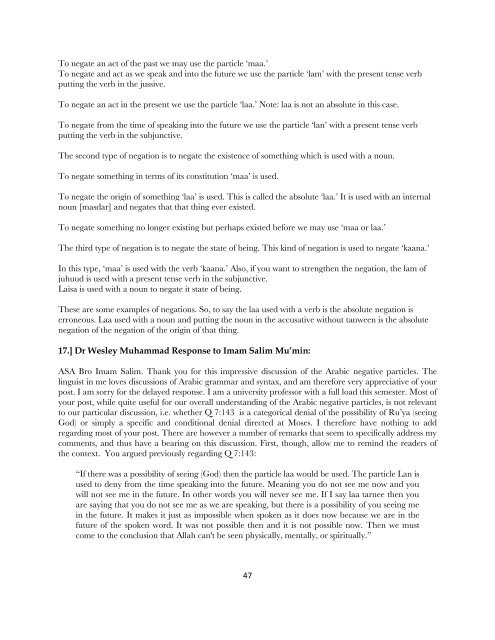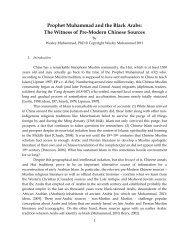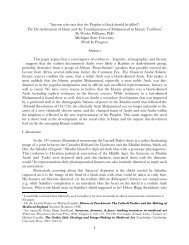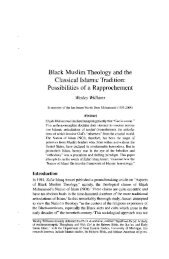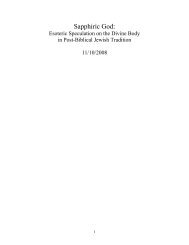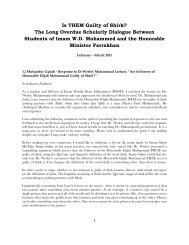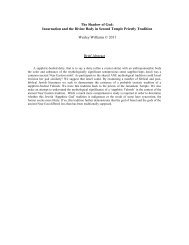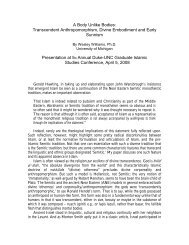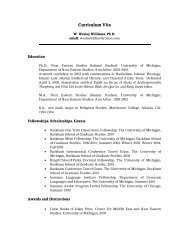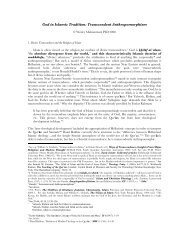Is THEM Guilty of Shirk? - Dr. Wesley Muhammad
Is THEM Guilty of Shirk? - Dr. Wesley Muhammad
Is THEM Guilty of Shirk? - Dr. Wesley Muhammad
You also want an ePaper? Increase the reach of your titles
YUMPU automatically turns print PDFs into web optimized ePapers that Google loves.
To negate an act <strong>of</strong> the past we may use the particle ‗maa.‘<br />
To negate and act as we speak and into the future we use the particle ‗lam‘ with the present tense verb<br />
putting the verb in the jussive.<br />
To negate an act in the present we use the particle ‗laa.‘ Note: laa is not an absolute in this case.<br />
To negate from the time <strong>of</strong> speaking into the future we use the particle ‗lan‘ with a present tense verb<br />
putting the verb in the subjunctive.<br />
The second type <strong>of</strong> negation is to negate the existence <strong>of</strong> something which is used with a noun.<br />
To negate something in terms <strong>of</strong> its constitution ‗maa‘ is used.<br />
To negate the origin <strong>of</strong> something ‗laa‘ is used. This is called the absolute ‗laa.‘ It is used with an internal<br />
noun [masdar] and negates that that thing ever existed.<br />
To negate something no longer existing but perhaps existed before we may use ‗maa or laa.‘<br />
The third type <strong>of</strong> negation is to negate the state <strong>of</strong> being. This kind <strong>of</strong> negation is used to negate ‗kaana.‘<br />
In this type, ‗maa‘ is used with the verb ‗kaana.‘ Also, if you want to strengthen the negation, the lam <strong>of</strong><br />
juhuud is used with a present tense verb in the subjunctive.<br />
Laisa is used with a noun to negate it state <strong>of</strong> being.<br />
These are some examples <strong>of</strong> negations. So, to say the laa used with a verb is the absolute negation is<br />
erroneous. Laa used with a noun and putting the noun in the accusative without tanween is the absolute<br />
negation <strong>of</strong> the negation <strong>of</strong> the origin <strong>of</strong> that thing.<br />
17.] <strong>Dr</strong> <strong>Wesley</strong> <strong>Muhammad</strong> Response to Imam Salim Mu‟min:<br />
ASA Bro Imam Salim. Thank you for this impressive discussion <strong>of</strong> the Arabic negative particles. The<br />
linguist in me loves discussions <strong>of</strong> Arabic grammar and syntax, and am therefore very appreciative <strong>of</strong> your<br />
post. I am sorry for the delayed response. I am a university pr<strong>of</strong>essor with a full load this semester. Most <strong>of</strong><br />
your post, while quite useful for our overall understanding <strong>of</strong> the Arabic negative particles, is not relevant<br />
to our particular discussion, i.e. whether Q 7:143 is a categorical denial <strong>of</strong> the possibility <strong>of</strong> Ru‘ya (seeing<br />
God) or simply a specific and conditional denial directed at Moses. I therefore have nothing to add<br />
regarding most <strong>of</strong> your post. There are however a number <strong>of</strong> remarks that seem to specifically address my<br />
comments, and thus have a bearing on this discussion. First, though, allow me to remind the readers <strong>of</strong><br />
the context. You argued previously regarding Q 7:143:<br />
―If there was a possibility <strong>of</strong> seeing (God) then the particle laa would be used. The particle Lan is<br />
used to deny from the time speaking into the future. Meaning you do not see me now and you<br />
will not see me in the future. In other words you will never see me. If I say laa tarnee then you<br />
are saying that you do not see me as we are speaking, but there is a possibility <strong>of</strong> you seeing me<br />
in the future. It makes it just as impossible when spoken as it does now because we are in the<br />
future <strong>of</strong> the spoken word. It was not possible then and it is not possible now. Then we must<br />
come to the conclusion that Allah can't be seen physically, mentally, or spiritually.‖<br />
47


